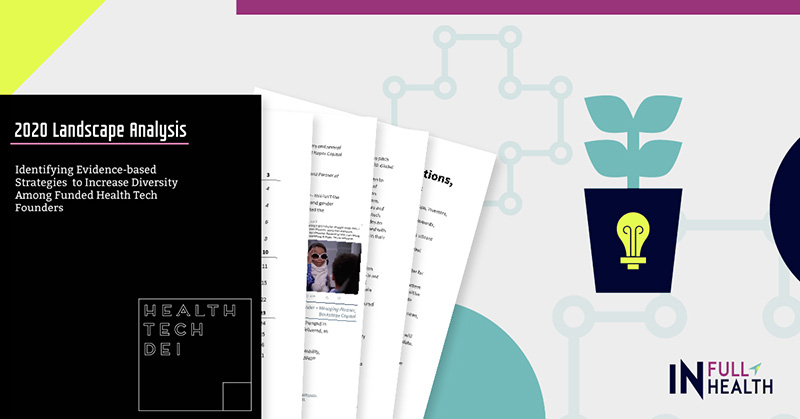Historically marginalized founders continuing to be passed over for funding isn’t a single problem, but rather a web of interconnected, systemic barriers present throughout the funding process.
The report, “Identifying Evidence-based Strategies to Increase Diversity Among Funded Health Tech Founders,” looks at both investor- and entrepreneur-focused interventions to provide a full look at what’s currently being done — and why it isn’t enough.
Read Part 1 and Part 2 of the Landscape Analysis Series.
The lack of diversity in health tech founders keeps good solutions from being successful — and it’s also keeping investors from success, too.
By not investing in the best solutions due to biased funding practices or a simple lack of awareness, the venture capital industry is leaving money — and lots of it — on the table.
In the third and final part of the Landscape Analysis series, it’s time to look at entrepreneur-focused interventions — and the next steps investors can take to prioritize diversity, equity, and inclusion in their own funds.
“It should be noted that throughout the research process there was very little outcomes and efficacy data — if or how well the intervention worked — available,” Juan and Kathryne explain. “This is likely due to a combination of factors, including how relatively recent many of these efforts are, and the difficulty in tracking and accessing investing data.”
How Do We Know What We Know?
 With the goal of identifying diversity-focused interventions, authors and founders of HealthTech DEI founders Kathryne Cooper and Juan Espinoza assessed practices from health care and comparable industries.
With the goal of identifying diversity-focused interventions, authors and founders of HealthTech DEI founders Kathryne Cooper and Juan Espinoza assessed practices from health care and comparable industries.
Based on an extensive literature review and the interviews of industry leaders, the report captures a range of strategies being utilized at both the investor level and the entrepreneurial level to increase diversity in healthtech funders receiving funds.
9 Entrepreneur-Focused Solutions and Interventions
In Part 2 of the Landscape Analysis series, we shared 8 investor-focused interventions outlined in the report. These interventions focused on ways to build equity and diversity into practices like data collection, hiring, education, and capital commitments.
While studies have proven that more diverse investing teams will back more diverse startups, Black and female venture capitalists are not without biases — and their attempts to center diversity are not without backlash, especially compared to their white, male counterparts.
As a result, the Landscape Analysis Report also highlights interventions that focus on underrepresented entrepreneurs — and putting capital and resources in their hands directly.
SUBSCRIBE
Stay in the loop about new blog posts from equitable health innovation leaders, helpful resources and tools to help you bring the Principles to life, upcoming events, and more by joining our email list.
SUBSCRIBEHere are 9 entrepreneur-focused interventions outlined in the report.
 Capacity Building
Capacity Building
Seeing the restricted opportunities for underrepresented individuals to highlight the skills and knowledge of entrepreneurship, a large number of organizations are investing in building capacity amongst women and health tech founders of color. Bootcamps, online workshops, and other educational programs are just some of the interventions used to showcase historically underrepresented founders. These are wrap-around programs to build off of founders’ existing skills and knowledge of entrepreneurship
 See It to Be It
See It to Be It
Due to the historical lack of funded female and POC health tech innovators, some innovators may feel — sometimes without even realizing it — that entrepreneurship is not for them. Representation is a key part of inspiring and supporting rising innovators who may rarely see people like them succeeding as business owners. Because of this, organizations are looking into ways to recognize and honor female and POC founders as role models.
 Proactive Broadening of Sourcing and Deal Flow
Proactive Broadening of Sourcing and Deal Flow
After acknowledging that there are competent entrepreneurs to invest in — a bare minimum — the next intervention is making sure that venture capital firms are aware of investable underrepresented founders. As a result, some programs seek to boost the visibility of female and POC founders, while others focus on generating deal flow.
 Broadening VC’s Latent Networks
Broadening VC’s Latent Networks
Investors and funds within the venture capital industry are making an investment to establish deep connections with local groups that uphold their ideals on DEI. These value-based partnerships can help both the funds and the community partners to promote long-term success.
 Limited Partner-Driven Directives
Limited Partner-Driven Directives
Other interventions strive to use the influence that limited partners (LP) have over the industry in order to promote diversity. These initiatives call for LPs to assess VC proposals for more than simply fund performance and request to know the gender and racial breakdown of the businesses they support.
 Invest Capital
Invest Capital
Unfortunately, no amount of networking or mentoring can make up for the unequal wealth distribution and disproportionately low levels of venture capital funding directed at female- and POC-led enterprises. Although it might seem simple, one of the most direct methods to close the funding gap is to directly invest in Black, Latinx, and female founders.
 Pre-seed/Micro VC
Pre-seed/Micro VC
Smaller investments are becoming more important as starting a business becomes easier. To aid historically marginalized entrepreneurs in their endeavors, organizations are developing pre-seed, micro-VC, and pitch competitions that directly result in investments.
 Diversity, Equity, and Inclusion Influence
Diversity, Equity, and Inclusion Influence
Venture capitalists have the chance to affect the overall makeup of the firms they invest in — in addition to funding diverse teams. Some VC firms are doing this by including DEI metrics and goals in their term sheets, such as explicitly calling for diversity and inclusion policies to be adopted within a certain timeframe of the investment.
 Cold Inbounds
Cold Inbounds
Warm introductions allow select people to get their foot in the door — like when one investor introduces a solution developer to another investor they know. But investors and VC companies are realizing that there are structural and systemic barriers that prevent underrepresented founders from being able to benefit from warm introductions. If the VC industry really wants to increase the diversity of health tech founders, taking cold inbounds is a must.
Sign Up for a Workshop With HealthTech DEI
While interventions aimed at investors and entrepreneurs are a good stepping stone, little change has occurred as a result. Large-scale changes to the industry require a new way of thinking and funding led by equity champions.
Leaders looking at leveling the playing field should focus on what they can control, have domain experience in, and which result in direct capital deployment. One way to get started is with HealthTech DEI’s upcoming workshops based on the insights from the Landscape Analysis.
These workshops are intended to provide an opportunity for AMA partners to think critically about their funding and capital allocation practices as it relates to diversity, equity, and inclusion in health tech. Specifically, participants will focus on the impact their organizations and funding have on founders from historically marginalized backgrounds.
Some topics will include:
- Developing your network and community to build a robust pipeline of companies and founders
- Reviewing current DEI metrics of your investments and support
- Setting DEI goals and metrics
- Planning for prospective data collection
- Check writing and capital allocation
HealthTech DEI founders and authors of the Landscape Analysis Report Kathryne Cooper and Juan Espinoza are excited to host these workshops and continue the conversation started in the report.
“This process can be difficult for some, so doing this work in collaboration with other organizations helps build community and support,” say Juan and Kathryne. “Collaborating with others in a workshop setting can also generate new ideas and ways to tackle these challenges.”
Want to learn more about how your fund can advance equity in your investments? Wondering how to hold your organization accountable for real change? Curious about how effective your current strategies are?
Sign up for HealthTech DEI’s upcoming workshops for 1:1 support and guidance.
SUBSCRIBE
Stay in the loop about new blog posts from equitable health innovation leaders, helpful resources and tools to help you bring the Principles to life, upcoming events, and more by joining our email list.
SUBSCRIBE


Comments are closed.